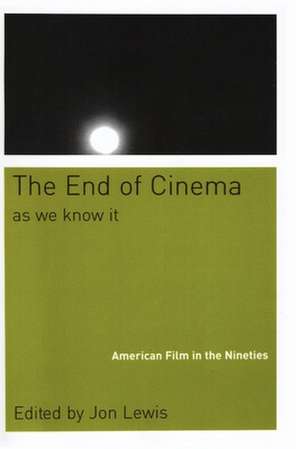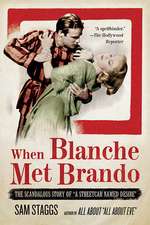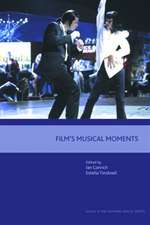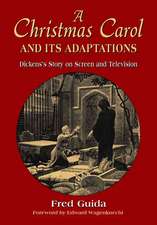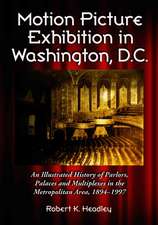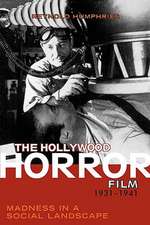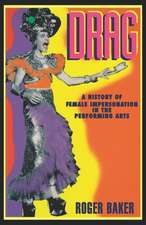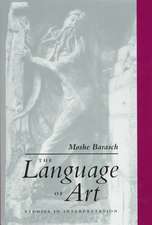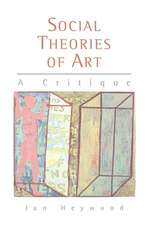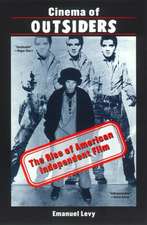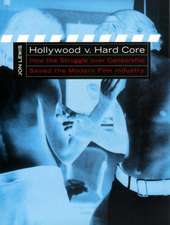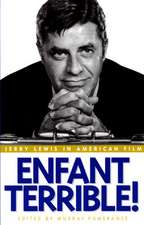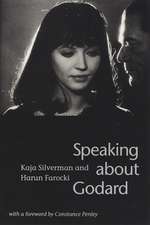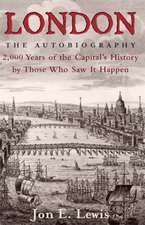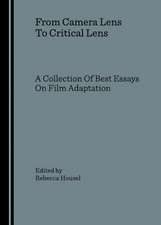The End Of Cinema As We Know It – American Film in the Nineties
Autor Jon Lewisen Limba Engleză Paperback – 30 noi 2001
| Toate formatele și edițiile | Preț | Express |
|---|---|---|
| Paperback (1) | 247.01 lei 6-8 săpt. | |
| MI – New York University – 30 noi 2001 | 247.01 lei 6-8 săpt. | |
| Hardback (1) | 530.74 lei 6-8 săpt. | |
| MI – New York University – 30 noi 2001 | 530.74 lei 6-8 săpt. |
Preț: 247.01 lei
Nou
Puncte Express: 371
Preț estimativ în valută:
47.26€ • 49.48$ • 39.11£
47.26€ • 49.48$ • 39.11£
Carte tipărită la comandă
Livrare economică 05-19 aprilie
Preluare comenzi: 021 569.72.76
Specificații
ISBN-13: 9780814751619
ISBN-10: 081475161X
Pagini: 386
Ilustrații: 38 b&w illustrations
Dimensiuni: 152 x 229 x 15 mm
Greutate: 0.54 kg
Editura: MI – New York University
ISBN-10: 081475161X
Pagini: 386
Ilustrații: 38 b&w illustrations
Dimensiuni: 152 x 229 x 15 mm
Greutate: 0.54 kg
Editura: MI – New York University
Recenzii
"Brief on brilliant cocktail conversation? This reader-friendly collection will help you apply Foucault to Keanu, Derrida to Spielberg, Macbeth to Blair Witch, and pull it off with panache. Stimulating in small doses, its 34 essays deconstruct 1990s cinema, and the decade too, with intellectual vigor and a wry sense of humor."
Variety"The End of Cinema as We Know It: American Cinema in the Nineties, is an encouraging step in a new direction. In it, we find an impressive assembly of established as well as younger scholars grappling both with pop-film and industry concerns."
Cineaste "The End of Cinema As We Know It is at once academic and popular in the best sense of both terms-intelligent and erudite critical analysis conveyed through accessible and gracefully written prose. Just like the cinema of the '90s itself, this collection of thirty-four smart and sprightly essays refuses to be bound by traditional categories. Free from the homogenized consensus that too often results from the supposed advantage of historical distance, these broadly ranging essays on a period still fresh in our memory necessarily pose more questions than they answer. But they are good provocative questions and it is precisely this spirit of free-wheeling inquiry and fearless speculation that makes the book so enjoyable to read."
Robert Rosen, Dean of the UCLA School of Theater, Film, and Television "The End of Cinema provides an enjoyable reading with a good balance of academic and popular qualities."
American Studies International, June 2002
Variety"The End of Cinema as We Know It: American Cinema in the Nineties, is an encouraging step in a new direction. In it, we find an impressive assembly of established as well as younger scholars grappling both with pop-film and industry concerns."
Cineaste "The End of Cinema As We Know It is at once academic and popular in the best sense of both terms-intelligent and erudite critical analysis conveyed through accessible and gracefully written prose. Just like the cinema of the '90s itself, this collection of thirty-four smart and sprightly essays refuses to be bound by traditional categories. Free from the homogenized consensus that too often results from the supposed advantage of historical distance, these broadly ranging essays on a period still fresh in our memory necessarily pose more questions than they answer. But they are good provocative questions and it is precisely this spirit of free-wheeling inquiry and fearless speculation that makes the book so enjoyable to read."
Robert Rosen, Dean of the UCLA School of Theater, Film, and Television "The End of Cinema provides an enjoyable reading with a good balance of academic and popular qualities."
American Studies International, June 2002
